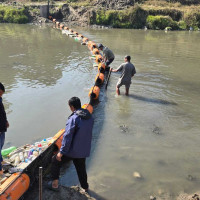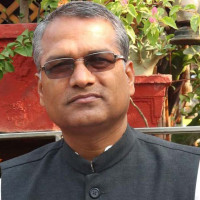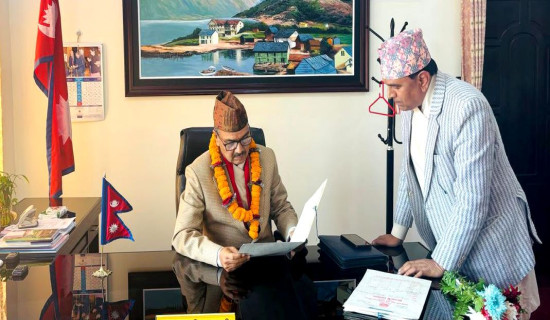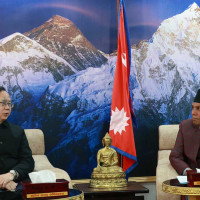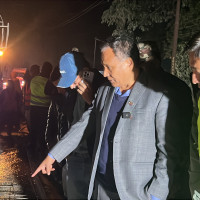- Sunday, 21 December 2025
Helpline to help the mentally desperate
Kathmandu, Oct. 12: If you are suffering from mental health issues and are being haunted by suicidal thoughts with urgent need of help, give a call on ‘1166’ for free from the SIM cards of any of the telecommunication companies in Nepal. The four-digit helpline number for suicide prevention has been fully functional since May 5, 2021, as a short-term strategy against mental health issues.
The helpline is operated from an office at the Lagankhel-based Mental Hospital. According to the authorities, there are five counsellors who have been given the responsibility of attending to the calls 24/7.
“The five counsellors take turns and manage the time to operate the helpline number 24 hours a day. At a time when mental health services are not available throughout the country, the helpline system has been of great support in saving many lives,” said Dr. Basudev Karki, a senior consultant psychiatrist at the Mental Hospital.
According to the helpline operators, they have received a total of 16,551 calls at the helpline number ‘1166’ from May 2021 to September 2023. However, not all of the calls were to seek counselling.
“Of the total calls until September 2023, 2,395 calls sought counselling related to different mental health issues while 1,488 calls were by individuals with suicidal thoughts,” said Sandhya Khatiwada, one of the five counsellors for the helpline number.
However, Dr. Karki informed that the helpline number did not always receive calls seeking help.
“Until September 2023, 4,013 wrong number calls were received. Similarly, there were 1,828 query calls, 928 bluff calls and 55 abusive calls,” said Khatiwada.
Khatiwada added, “There were also 2,750 silent calls. Silent calls are calls where the callers do not speak after calling because of fear. We try encouraging them to talk or even call them back. We also call back the numbers we could not receive.”
After providing counselling for the first time, the counsellors at the helpline service stay in touch with the callers, suggest visiting a nearby health centre with mental health services if needed, and even talk with their friends and family members.
Moreover, the helpline has also received 17 crisis calls since May 2021. “The crisis calls are calls where individuals call after taking suicidal steps. For example, an individual who tried committing suicide by overdosing
on medicine called us after it became painful. Someone has called after slitting hands. Some have even called after preparing to hang themselves. We have been able to coordinate with security forces and save all of them,” said Khatiwada.
Khatiwada also informed that they had not received information of any of the callers with suicidal thoughts to have committed suicide after receiving counselling.
“Suicide is preventable if an individual can share his/her problems freely. Hiding problems and taking stress results in mental health issues and leads to the rise of suicidal thoughts,” said Dr. Karki.
Nevertheless, Dr. Karki argued that at a time when there are a handful of health centres providing mental health-related services only in major cities of Nepal, expanding the capacity of the helpline number and promoting it would help making it accessible for even the Nepalis living in remote areas.
Challenges counsellors face
According to counsellor Khatiwada, language barrier was a major challenge. “We do not understand the tone and language used by Nepalis in Sudurpashchim and Karnali Province. We also struggle when we receive call from someone who only speaks in their mother tongue, for example, Maithili and Bhojpuri,” she added.
The counsellors also argued that while there was a proper coordination between the helpline service and Nepal Police units in the Kathmandu Valley, the coordination was not robust outside.
“We once received a call from Dhangadhi where a man said he was committing suicide. However, he did not provide any further information. It was difficult to coordinate with Dhangadhi Police because it was also a first-of-its-kind situation for them,” said Khatiwada, who added, “The man was found and saved at last.” Counsellors stressed that the inability to track phone calls to identify the location of the callers was also a major challenge.
Way forward
Mental health experts argued that the government was taking effective steps in the mental health sector since the COVID-19 pandemic. It was also in 2021 that the report of the first mental health survey in the country was released.
According to the National Mental Health Survey 2020, around 80 per cent of the people who need mental health care do not get it. Nepal Police data also shows that suicide, which is a crime in Nepal, was the second-highest reported crime (6,792) in the fiscal year 2021/22 after offences against public peace (8,550).
“A national plan on suicide prevention and mental health issues is being prepared by the National Planning Commission. It will ensure a proper system to operate the sector and allocate responsibilities for the federal, provincial and local levels. We need to decentralise mental health services,” said Dr. Karki.
As there are several language and geographical barriers, stakeholders have also suggested the need to expand the helpline number at least in provincial level to make the service more effective.
Since mental health issues in humans are a result of different problems caused by different things, a multi-sectoral coordination is a must, stressed Dr. Karki.
As a long-term plan of the Ministry of Health and Population, steps are also under way to establish a National Resource Centre for suicide prevention in the Mental Hospital to lead a multi-sectoral response. It is being facilitated by the World Health Organisation (WHO).
Mental health experts also argued that including basic mental health services under primary health care and expanding them throughout the country would be of great help.
Addressing a programme organised by the Ministry of Health and Population and the WHO on the occasion of World Mental Health Day in the capital on Tuesday, Prime Minister Pushpa Kamal Dahal ‘Prachanda’ said, “The government is taking steps to expand mental health services throughout the country by including them under primary health services.”
“The main step we should focus on is to make mental health treatment and diagnosis available in more and more health centres. Until then, expanding the capacity of the helpline ‘1166’ is the best way to provide counselling to more and more Nepalis,” Dr. Karki suggested.




